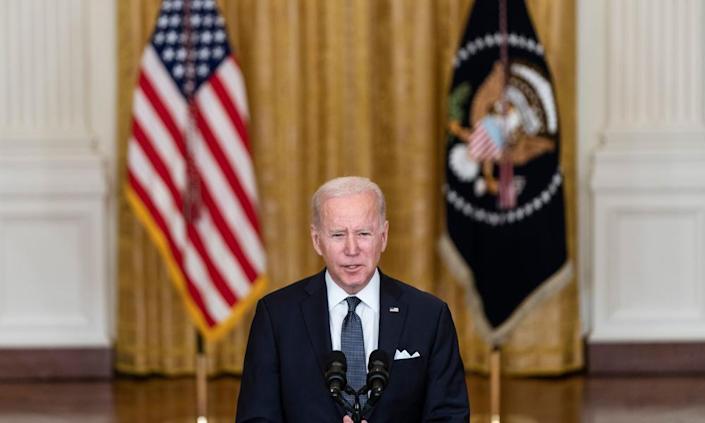Joe Biden’s speech sounded like a closing argument, one that had been honed for some time and one that suggested expectations are still high in the White House that Russia will take military action.
Biden briefly nodded to Moscow’s claims to be withdrawing before abruptly contradicting them, raising the US estimate of the number of troops surrounding Ukraine to 150,000 in a “threatening position”.
It was the sort of speech normally delivered on the eve of momentous action, usually military action, to prepare expectations of the population. Biden addressed the American people directly, telling them he was not going to “pretend this will be painless” and that they would feel it at the petrol pump. He promised his administration would do what it could to alleviate that.
Related: Biden: Ukraine invasion still ‘distinctly possible’ despite Russian claims
The president also sought to speak over Putin’s head to ordinary Russians, who have heard little from their own media about the unprecedented deployments of their soldiers around Ukraine. Biden talked about their “deep ties of family history and culture” to the Ukrainians, and warned a war would bloody the country’s reputation in the history books. The world, he said, would “not forget that Russia chose needless death and destruction”.
He made clear that the US remained open for negotiations on mutual security concerns, saying they would pursue talks “as long as there is hope” for diplomacy, but he stuck to the US position there would no compromise on the fundamental principle of the right of Ukraine and other states to choose their alliances.
Earlier in the day, the German chancellor, Olaf Scholz, had stressed that Ukrainian membership would not happen in the foreseeable future, but Biden did not echo that conciliatory note. The US has already concluded that such verbal assurances will not be enough for Putin.
The speech was part of what seems to be a very deliberate policy of this administration to think out loud about the crisis, consistently briefing its worse fears, even if it means aggravating its allies in Kyiv. The logic seems to be: we don’t know for sure what Putin will do, but we do know he likes to control the narrative, and spring the surprises. So why not create an environment of worst-case predictions, in which the only way the Russian leader can surprise the west is to opt for peace.
Biden’s concluding declaration – “If we do not stand for freedom where it is at risk today, we’ll surely pay a steeper price tomorrow” – is likely to be greeted with grim mirth in Kyiv, in the wake of the US embassy’s evacuation and the retreat of American diplomats to the western end of the country. But the US has kept up arms supplies, and is reportedly making arrangements to keep the weapons flowing to an Ukrainian insurgency if it comes to that.
This administration is well aware that it has been portrayed as weak for the manner in which it left Afghanistan.
But Biden had long ago lost faith in the US mission there, whereas he believes wholeheartedly in Nato. He used the word “sacrosanct” to describe America’s obligation to its allies. It was deliberately resonant language. Biden is clearly aware this could turn out to be a defining test of his presidency.




